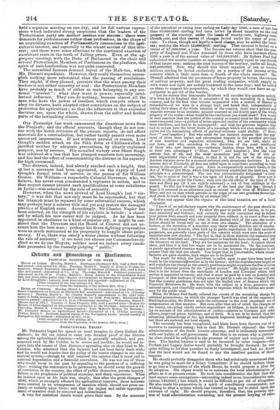Our Postscript last week announced the disastrous news from the
Punjaub; and the official accounts, though they do not con- cur with the harsh criticism of the private reports, do not afford materials for a contradiction, but rather tacitly permit even more untoward impressions. If not without pretext or reason, Lord Gough's sudden attack on the Sikh force at Chillianwallah is justified neither by adequate precautions, by clearly explained purpose, nor by success. His so-called victory over Shere Singh was achieved at a loss that has plunged numbers into mourning, and has had the effect of consummating the distrust in his capacity for high command.
This distrust, indeed, had already reached such a height, that at last a successor had been appointed, on the expiry of Lord Gough's formal term of service, in the person of Sir William Gomm. Sir William—a respectable Colonial Governor, who, we believe, has never even commanded a regiment in action, and in that respect cannot present such qualifications as some subalterns in India—was selected by the rule of seniority. However, when the news arrived of Lord Gough's last "vic- tory," it was felt that not only must he be superseded, but that his triumph must be repaired by some substantial success, which may perhaps bear a soberer title and yet may restore the damaged prestige of English arms. Accordingly, Sir Charles Napier has been selected, on the strength of his exploits in Scinde ; a stand- ard by which his new career will be judged. As he has been appointed in obedience to a kind of popular cry, it might be sur- mised that the Directors and the Board of Control did not ac- count him the best man : perhaps his fierce fighting propensities were as much mistrusted as his propensity to haggle about prize- money. If so, there was surely a wider choice without following the rule of seniority : if we need not choose our Commanders-in- chief as we do our Mayors, neither need we induct every candi- date presented by the coarsely-judging "public."


























 Previous page
Previous page